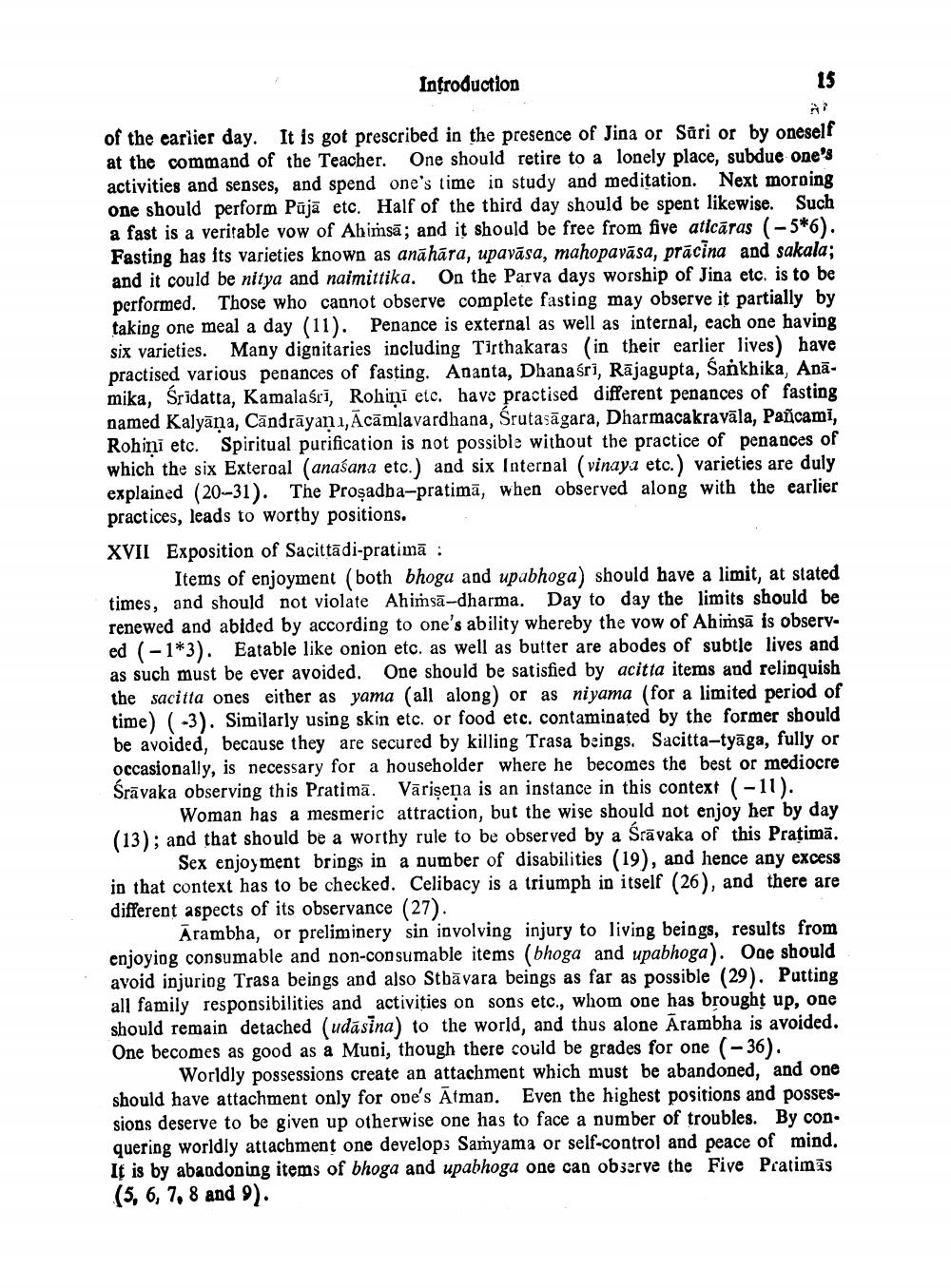________________
Introduction
15
of the earlier day. It is got prescribed in the presence of Jina or Sûri or by oneself at the command of the Teacher. One should retire to a lonely place, subdue one's activities and senses, and spend one's time in study and meditation. Next moroing one should perform Pūjā etc. Half of the third day should be spent likewise. Such a fast is a veritable vow of Ahimsā; and it should be free from five aticāras (-5*6). Fasting has its varieties known as anāhāra, upavāsa, mahopavāsa, pracina and sakala; and it could be nitya and naimittika. On the Parva days worship of Jina etc. is to be performed. Those who cannot observe complete fasting may observe it partially by taking one meal a day (11). Penance is external as well as internal, each one having six varieties. Many dignitaries including Tirthakaras (in their earlier lives) have practised various penances of fasting. Ananta, Dhanasri, Rājagupta, Sankhika, Anāmika, Sridatta, Kamalasri, Rohini etc. have practised different penances of fasting named Kalyāṇa, Cāndrāyanı, Ācāmlavardhana, Śrutasāgara, Dharmacakravāla, Pancami, Rohiņi etc. Spiritual purification is not possible without the practice of penances of which the six Exteroal (anaśana etc.) and six Internal (vinaya etc.) varieties are duly explained (20-31). The Proşadba-pratimā, when observed along with the earlier practices, leads to worthy positions. XVII Exposition of Sacittādi-pratimā :
Items of enjoyment (both bhoga and upabhoga) should have a limit, at stated times, and should not violate Ahimsā--dharma. Day to day the limits should be renewed and abided by according to one's ability whereby the vow of Ahimsā is observe ed (-1*3). Eatable like onion etc. as well as butter are abodes of subtle lives and as such must be ever avoided. One should be satisfied by acitta items and relinquish the sacitta ones either as yama (all along) or as niyama (for a limited period of time) (-3). Similarly using skin etc. or food etc. contaminated by the former should be avoided, because they are secured by killing Trasa beings. Sacitta-tyāga, fully or occasionally, is necessary for a householder where he becomes the best or mediocre Śrāvaka observing this Pratimā. Vārişeņa is an instance in this context (-11).
Woman has a mesmeric attraction, but the wise should not enjoy her by day (13); and that should be a worthy rule to be observed by a Srāvaka of this Pratimā.
Sex enjoyment brings in a number of disabilities (19), and hence any excess in that context has to be checked. Celibacy is a triumph in itself (26), and there are different aspects of its observance (27)
Ārambha, or preliminery sin involving injury to living beings, results from enjoying consumable and non-consumable items (bhoga and upabhoga). One should avoid injuring Trasa beings and also Sthāvara beings as far as possible (29). Putting all family responsibilities and activities on sons etc., whom one has brought up, one should remain detached (udasina) to the world, and thus alone Arambha is avoided. One becomes as good as a Muoi, though there could be grades for one (-36).
Worldly possessions create an attachment which must be abandoned, and one should have attachment only for ope's Ātman. Even the highest positions and possessions deserve to be given up otherwise one has to face a number of troubles. By con. quering worldly attachment one develop3 Samyama or self-control and peace of mind. It is by abandoning items of bhoga and upabhoga one can observe the Five Pratimās (5, 6, 7, 8 and 9).




